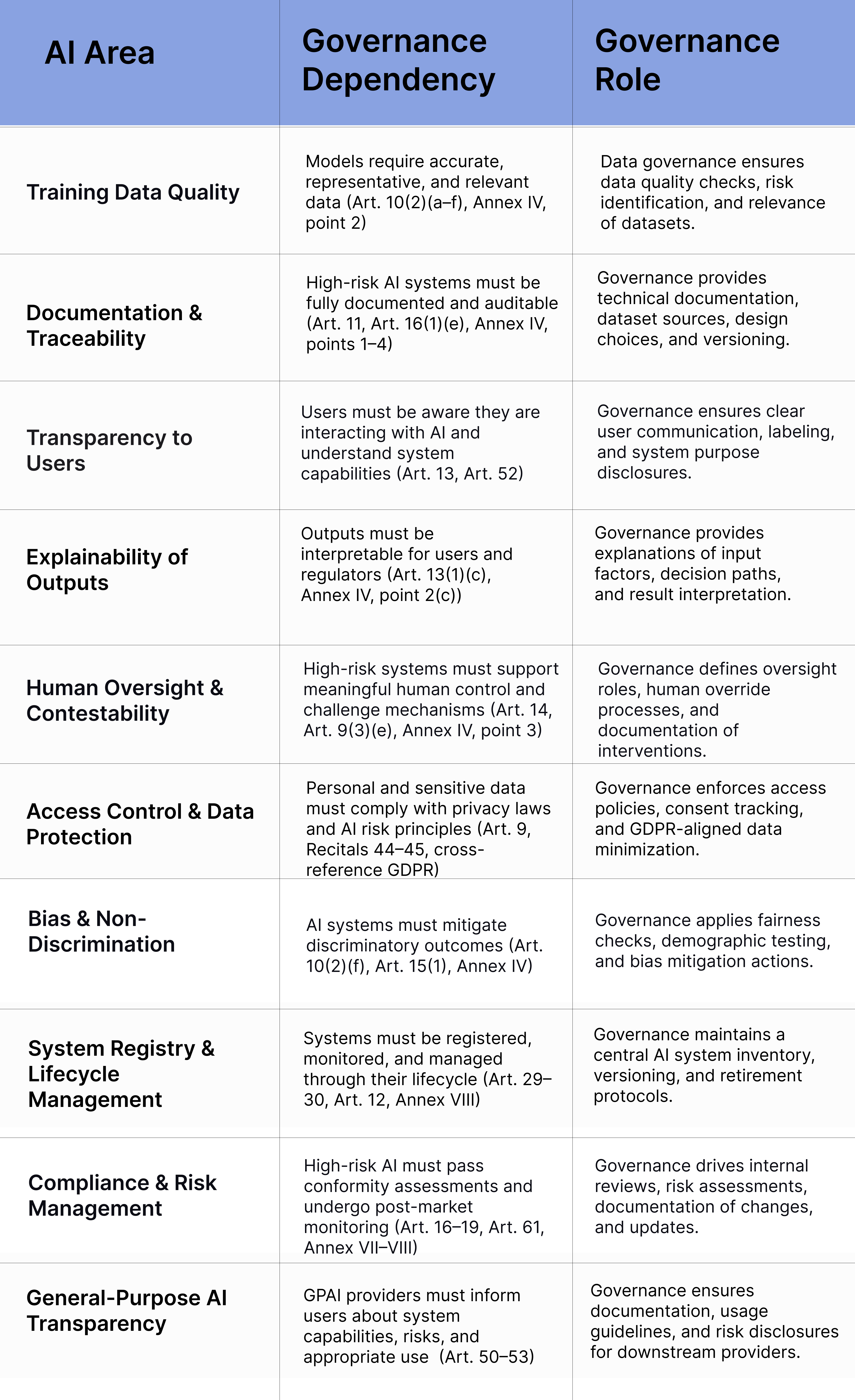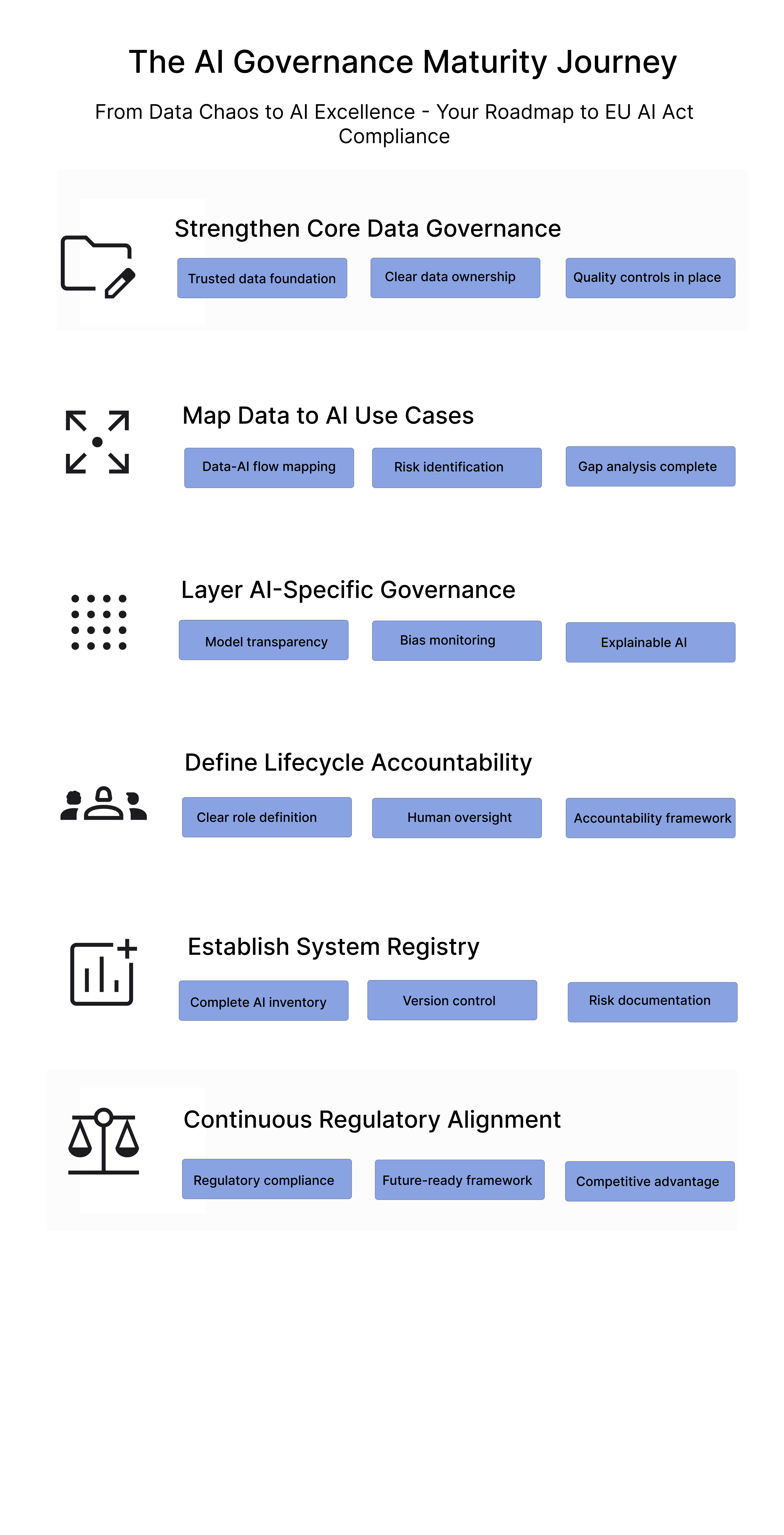Why AI Fails Without Data Governance

Audio Highlights
This component uses custom JavaScript to open and close. Custom attributes and additional custom JavaScript is added to this component to make it accessible.
Video Highlights
This component uses custom JavaScript to open and close. Custom attributes and additional custom JavaScript is added to this component to make it accessible.
Over the past few years, we’ve supported organizations across industries in shaping their data strategies and building real-world AI capabilities. And one pattern keeps surfacing: without strong data governance, AI won’t deliver its full business value-or scale reliably.
AI initiatives often launch with big ambitions, but when the underlying data isn’t trusted, traceable, or well-managed, results become inconsistent, models degrade quickly, and compliance risks grow. That’s no longer just a technical issue - it's a business risk.
With the introduction of the EU AI Act (Regulation (EU) 2024/1689), the need for data governance has moved from “nice to have” to legally essential. For organizations working with high-risk AI systems - or even general-purpose models — clear documentation, data quality, and accountability are now mandatory.
What you'll discover in this post:
- Why data governance is the foundation that determines AI success or failure
- How the EU AI Act makes governance legally mandatory, not optional
- A practical framework for evolving from data governance to comprehensive AI governance
- Actionable steps to build compliance-ready governance that drives business value
Why Governance Is The Foundation of Effective AI
Algorithms may drive AI, but its real engine is data. And just like any engine, if the input is flawed — inconsistent, incomplete, biased, or undocumented - the output won’t be reliable. That’s where data governance, increasingly referred to as AI governance, becomes essential.
.png)
- Better Data, Smarter AI
AI learns from your data — if the data’s messy, the decisions will be too. Quality data means confident, accurate outcomes.
- No Visibility, No Accountability
You can’t manage what you can’t trace. Governance provides full data lineage, critical for compliance and building customer trust.
- Bias Hides in the Data
Most AI bias starts with training data. Governance helps detect and correct it before it damages reputation or violates regulations.
- Scale Needs Structure
AI can’t scale on chaos. Governance ensures consistency, reuse, and trust across teams, products, and markets.
What Does the EU AI Act Really Mean for AI Governance?

Start with Data Governance, Extend to AI Governance
If your organization is serious about AI, data governance isn’t optional. It’s the foundation that ensures your models are trained on trusted, consistent, and compliant data. Without it, even the most advanced AI will struggle to produce reliable or explainable outcomes.
But as AI systems move from experimentation to real-world deployment, governance must go further — from managing data to managing models, risks, decisions, and accountability.
How Do You Go from Governing Data to Governing AI?

- Strengthen core data governance
Ensure data quality, lineage, classification, and access control are firmly in place across domains.
- Map data governance to AI use cases
Identify how governed data flows into AI systems — and where gaps or risks might emerge.
- Layer in AI-specific governance
Introduce controls for model transparency, bias monitoring, explainability, and performance tracking.
- Define accountability across the AI lifecycle
Assign clear roles for data stewards, model owners, and compliance officers — including human oversight mechanisms.
- Establish centralized oversight and a system registry
Maintain a living inventory of AI systems, linked to documentation, versioning, and risk profiles.
- Continuously align with the EU AI Act and other regulations
Treat governance as a living process that evolves with the regulatory landscape and technology maturity.
Treat AI governance as a business enabler, not a compliance burden. When done right, it creates the foundation for scaling AI with confidence.
Ready to Build AI Governance That Actually Works?
Don't let poor data governance derail your AI ambitions. Organizations that get ahead of the EU AI Act requirements and build robust governance frameworks now will have a significant competitive advantage as regulations tighten and AI adoption accelerates.
We've helped Fortune 500 companies and innovative startups navigate these exact challenges. Our proven methodology turn complex, disorganized data into structured, AI-ready governance frameworks that meet regulatory requirements and support business goals.
What You Get:
- EU AI Act Compliance Assessment - Identify your gaps before regulators do
- Custom Data / AI Governance Framework - Tailored to your industry, data, and risk profile
- Data Strategy Implementation Roadmap - Step-by-step plan with quick wins and long-term strategy
- Team Training & Change Management - Ensure adoption across data, ML, and business teams
Ready to turn AI governance from a compliance headache into a competitive advantage? Schedule Your Free AI Governance Consultation.

.jpg)


















